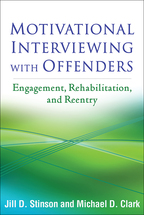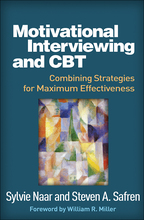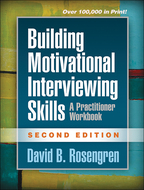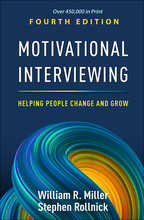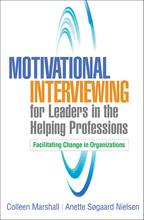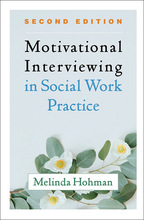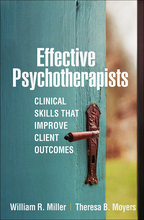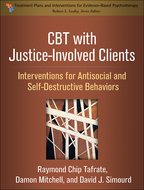Motivational Interviewing with Offenders
Engagement, Rehabilitation, and Reentry
Jill D. Stinson and Michael D. Clark
HardcoverPaperbacke-bookprint + e-book
Hardcover
orderJune 23, 2017
ISBN 9781462529889
Price: $68.00 264 Pages
Size: 6" x 9"
Paperback
orderJune 28, 2017
ISBN 9781462529872
Price: $45.00264 Pages
Size: 6" x 9"
Sign up for emails on upcoming titles on Motivational Approaches (with special discounts)!
“Motivational Interviewing (MI) has a natural home in serving society’s most marginalized people, and perhaps no group fits that description as well as sexual offenders….The book presents many practical examples of how to incorporate the spirit of MI into a variety of aspects of sex offender treatment and management, from the first contact with the sex offender to management of them in the community. There is a good balance between practical information and the philosophy behind MI and the rationale for applying it to sex offenders….I would recommend this book to practitioners of all levels of experience and skill. For new therapists, the material is presented in a way that is easily understandable and practical. For the seasoned veteran this book will provide new and different ways to engage clients and remind us to think of our clients as being more than just their offending.”

—Association for the Treatment of Sexual Offenders (ATSA) Forum
“MI has deservedly gained a substantial national and international following because of its positive pathways to creating change. This clearly written, easily accessible book—with examples throughout—explains the philosophy, rationale, strategy, and tactics of applying MI in criminal justice and related settings. Mental health and criminal justice professionals and students who are interested in correctional rehabilitation, probation and parole, offender reentry, restorative justice, or alternative dispute resolution should view this book as essential reading.”

—Bruce D. Sales, PhD, JD, ScD (h.c.), Virginia L. Roberts Professor, Department of Criminal Justice, Indiana University Bloomington
“This is a book that many of us have been anticipating for a long time. MI is one of a small number of true evidence-based (and strengths-based!) success stories in offender rehabilitation. This book brings the technique alive in a way that I hope will transform theory and practice in the field.”

—Shadd Maruna, PhD, Professor of Criminology, University of Manchester, United Kingdom
“Comprehensive, practical, and easy to read. Motivational Interviewing with Offenders addresses all aspects of the offender change process—assessment, treatment, case management, and supervision. Everything one needs to apply MI is contained in this book. It should be mandatory reading for clinicians; students and interns; parole, probation, and correctional officers; residential staff members; and program administrators and supervisors. Even the most experienced change agent will benefit from the book's respectful approach and plentiful, very helpful examples.”

—Pamela M. Yates, PhD, Cabot Consulting and Research Services, Ottawa, Ontario, Canada
“Whether you deliver direct treatment or offender supervision services, manage programs responsible for achieving improved offender outcomes, or design systemwide interventions to improve public safety, this refreshingly readable book articulates a proven way forward. While a court may order treatment, it cannot order lasting change—commitment to real change and long-term recovery is always a choice. This book outlines the essentials for helping an offender to make that choice and move from conflict, to compliance, to commitment. I highly recommend it for anyone working with justice system–involved individuals, and especially those working in treatment courts.”

—Terrence D. Walton, MSW, CSAC, Chief Operating Officer, National Association of Drug Court Professionals
“Stinson and Clark beautifully illustrate an empirically guided intervention approach that is respectful of offenders' autonomy and capacity to change. They convincingly demonstrate how MI is able to provide people who have committed crimes with the internal and external resources to enhance their quality of life and reduce the chances of further harm to the community. The book is beautifully written, scholarly, and accessible to practitioners, policymakers, and researchers. In my view, this is one of the most important books of the decade on offender rehabilitation.”

—Tony Ward, PhD, School of Psychology, Victoria University of Wellington, New Zealand
—Association for the Treatment of Sexual Offenders (ATSA) Forum
“MI has deservedly gained a substantial national and international following because of its positive pathways to creating change. This clearly written, easily accessible book—with examples throughout—explains the philosophy, rationale, strategy, and tactics of applying MI in criminal justice and related settings. Mental health and criminal justice professionals and students who are interested in correctional rehabilitation, probation and parole, offender reentry, restorative justice, or alternative dispute resolution should view this book as essential reading.”
—Bruce D. Sales, PhD, JD, ScD (h.c.), Virginia L. Roberts Professor, Department of Criminal Justice, Indiana University Bloomington
“This is a book that many of us have been anticipating for a long time. MI is one of a small number of true evidence-based (and strengths-based!) success stories in offender rehabilitation. This book brings the technique alive in a way that I hope will transform theory and practice in the field.”
—Shadd Maruna, PhD, Professor of Criminology, University of Manchester, United Kingdom
“Comprehensive, practical, and easy to read. Motivational Interviewing with Offenders addresses all aspects of the offender change process—assessment, treatment, case management, and supervision. Everything one needs to apply MI is contained in this book. It should be mandatory reading for clinicians; students and interns; parole, probation, and correctional officers; residential staff members; and program administrators and supervisors. Even the most experienced change agent will benefit from the book's respectful approach and plentiful, very helpful examples.”
—Pamela M. Yates, PhD, Cabot Consulting and Research Services, Ottawa, Ontario, Canada
“Whether you deliver direct treatment or offender supervision services, manage programs responsible for achieving improved offender outcomes, or design systemwide interventions to improve public safety, this refreshingly readable book articulates a proven way forward. While a court may order treatment, it cannot order lasting change—commitment to real change and long-term recovery is always a choice. This book outlines the essentials for helping an offender to make that choice and move from conflict, to compliance, to commitment. I highly recommend it for anyone working with justice system–involved individuals, and especially those working in treatment courts.”
—Terrence D. Walton, MSW, CSAC, Chief Operating Officer, National Association of Drug Court Professionals
“Stinson and Clark beautifully illustrate an empirically guided intervention approach that is respectful of offenders' autonomy and capacity to change. They convincingly demonstrate how MI is able to provide people who have committed crimes with the internal and external resources to enhance their quality of life and reduce the chances of further harm to the community. The book is beautifully written, scholarly, and accessible to practitioners, policymakers, and researchers. In my view, this is one of the most important books of the decade on offender rehabilitation.”
—Tony Ward, PhD, School of Psychology, Victoria University of Wellington, New Zealand

